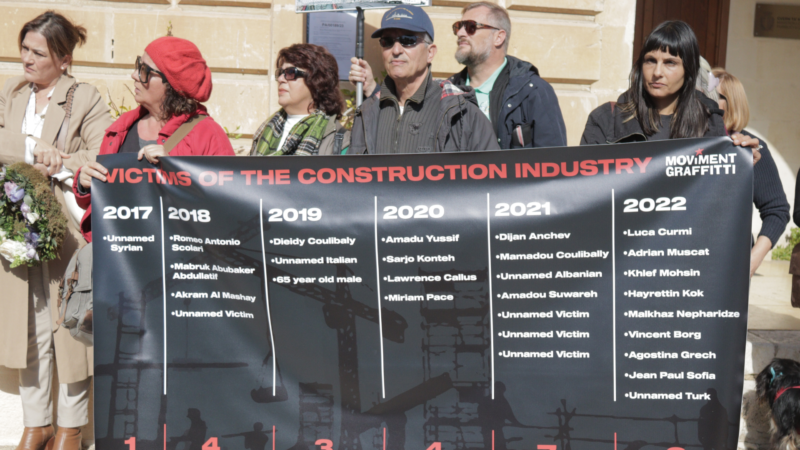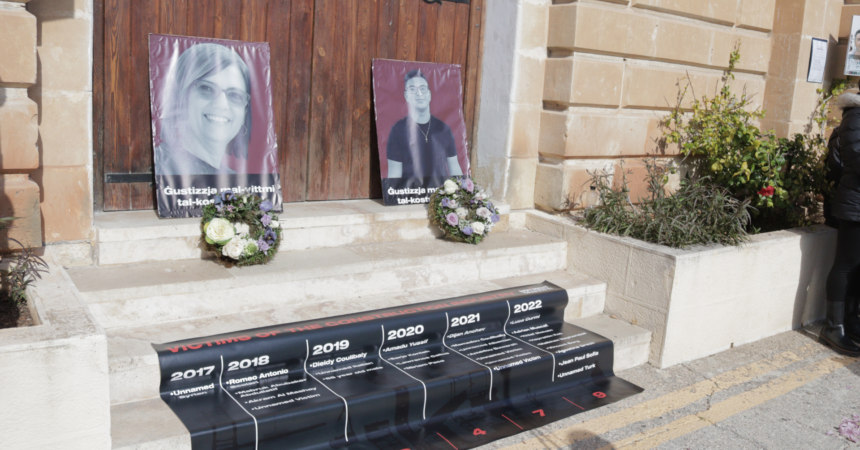Responsibility for a string of recent construction-related deaths was laid at the doorstep of Planning Minister Stefan Zrinzo Azzopardi on Saturday by activists demanding the reform of a deadly system that continues to be “ruled by greed”.
It was exactly two months ago that the lifeless body of 20-year-old Jean Paul Sofia was found under the rubble of a collapsed building in Corradino, Moviment Graffitti, which organised the demonstration, noted. Five other workers had been seriously injured in the incident, three of them critically.
And it was only three years ago, on 2 March 2020, that Miriam Pace was killed in her home after the whole building collapsed as a result of construction works on an adjacent site.
The workplace death of construction workers has also become a monthly occurrence and thousands of people are being injured on construction sites every year.
“These are not tragic accidents but the inevitable consequence of a rotten system designed to satisfy the insatiable hunger for the profit of developers and other businesses in the construction sector,” Moviment Graffitti said of the state of affairs.
“The deaths of Jean Paul Sofia, Miriam Pace, and all construction workers who perished at their workplaces were preventable. Their lives have been sacrificed at the altar of greed.”

Demonstrators against construction-related deaths outside the Planning Ministry in Floriana on Saturday. Photo: Moviment Graffitti
Noting with disappointment that no one has been yet charged with Jean Paul Sofia’s death, activists underscored how “real justice for all the victims of the construction industry will only be served when the systemic factors that have allowed this rot to fester are addressed”.
Public inquiry into Sofia’s death would ‘uncover systemic failures’
To this end, they supported calls for a public inquiry into the death of Jean Paul Sofia “since this will go beyond identifying individual responsibility and uncover systemic failures”. The Prime Minister recently indicated that there would be no such inquiry.
Over the past decade, activists said on Saturday, the authorities have green-lighted a building spree in a context “that lacks the very basic regulation and enforcement framework protecting workers and residents”.
Following a spate of building collapses in 2019, and the death of Miriam Pace in 2020, the government promised a series of reforms in the sector.
“Tragically, the reform promised in the wake of Miriam Pace’s death has failed to materialise beyond a few cosmetic changes,” protesters charged, listing out four “glaring examples”.
The organisation pointed out that the licensing of contractors has still not come into force, saying developers have vetoed its introduction. “An effective licensing system would ensure that operators involved in the construction sector are trustworthy and adequately trained and, most importantly, establish a mechanism by which licenses can be revoked when operators engage in malpractices.”

Photo: Moviment Graffitti
There are still no Building and Construction Codes. “Incredible but true,” the NGO said. “There are currently no laws that regulate basic aspects of the construction process, such as what construction machinery and material can be used, where and how”.
The Building and Construction Authority (BCA) established two years ago has become another dysfunctional authority seized by developers’ interests, the type of authorities we have become accustomed to in the environment and planning sector, Moviment Graffitti said.
The organisation referred to the Chair of the BCA Board, Maria Schembri Grima, as one of the main architects of some of Malta’s most ruthless developers, such as Joseph Portelli and Michael Stivala, and the rest of the Board is composed of political appointees, which The Shift has reported.
“The BCA has very little to show for its work. The reforms it should have spearheaded have stalled, and enforcement in the construction industry remains far from sufficient.”
The wider planning and construction regime has not seen any sign of reforms. The NGO referred to the four-storey building that collapsed in Corradino had been given the go-ahead by means of two Development Notification Orders (DNOs). “DNOs allow applicants to bypass the planning system and build entire structures on the strength of a mere notification, without any serious evaluation of the building project.”
Moviment Graffitti warned that “the failure to reform the deadly construction industry lies in the power of developers to veto any serious measure that can safeguard people’s safety and quality of life,” adding, ” it is truly shameful and worrying that the government is willing to accede to this lobby’s demands instead of protecting the workers and residents in Malta and Gozo”.













Although these actions are necessary to highlight the mafia’s contempt for life, nothing really will happen, those responsible are too close to the Mafia hierarchy so it will all “disappear” yet again.
Well done Moviment Graffitti, they shall not be forgotten.